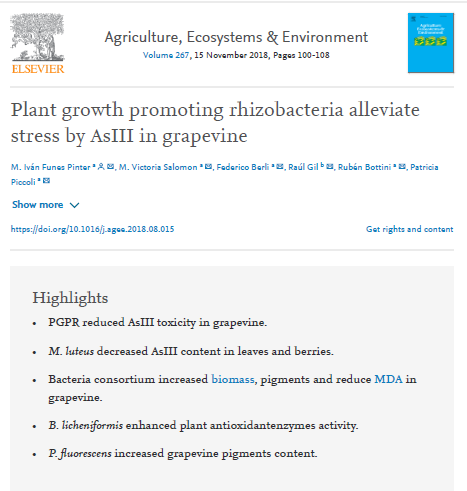Plant growth promoting rhizobacteria alleviate stress by AsIII in grapevine.
Date
2018-11-15Author
Funes Pinter, Mariano Iván
Salomón, María Victoria
Berli, Federico
Gil, Raúl
Bottini, Rubén
Piccoli, Patricia
Metadata
Show full item recordAbstract
Arsenic (As) in the environment is an increasing problem all over the world that limits crop yield, and therefore, remediation strategies like inoculation with plant growth promoting rhizobacteria (PGPR) are necessary. The objective of the current study was to assess PGPR ability to reduce AsIII toxicity in grapevine (Vitis vinifera L. cv. Malbec). Two-year old grape plant-sprouts grown in 10 L pots were inoculated weekly with Bacillus licheniformis, Micrococcus luteus, Pseudomonas fluorescens, a consortium of the three strains, or water (control). Plants were irrigated with water (-As) or a 50 mM solution of NaAsO (+As) during 150 days in a factorial arrangement of treatments (n = 7), and effects of PGPR, As, and their interactions were evaluated at the begging and at the end of the experiment. The PGPR consortium stimulated grapevine growth and fruit yield, reducing AsIII toxicity indicators. All the PGPR evaluated increased plant biomass and content of photosynthetic pigments in As presence. The activity of antioxidant enzymes was higher, mainly with B. licheniformis, while peroxidation of membrane lipids and photosystems damage were reduced in bacterized treatments. AsIII accumulation in leaves and berries were reduced by M. luteus, while P. fluorescens and the PGPR consortium increased the metalloid concentration in leaves. Our results indicated that M. luteus was able to significantly reduce AsIII intake in grapevine, while the PGPR consortium accumulated more AsIII in leaves, but increased plant defense mechanisms reducing most of AsIII toxic effects. Sitio de la revista: https://www.sciencedirect.com/science/article/abs/pii/S0167880918303542#! Fil: Funes Pinter, Mariano Iván. CONICET. Instituto de Biología Agrícola de Mendoza (IBAM). Universidad Nacional de Cuyo; Argentina. Fil: Salomón, María Victoria. CONICET. Instituto de Biología Agrícola de Mendoza (IBAM). Universidad Nacional de Cuyo; Argentina. Fil: Berli, Federico. CONICET. Instituto de Biología Agrícola de Mendoza (IBAM). Universidad Nacional de Cuyo. Facultad de Ciencias Agrarias; Argentina. Fil: Gil, Raúl. CONICET. Instituto de Química de San Luis. Universidad Nacional de San Luis;, Argentina. Fil: Bottini, Rubén. CONICET. Instituto de Biología Agrícola de Mendoza. Universidad Nacional de Cuyo, Facultad de Ciencias Agrarias; Argentina. Fil: Piccoli, Patricia. CONICET. Instituto de Biología Agrícola de Mendoza (IBAM). Universidad Nacional de Cuyo; Argentina.
Subject
ArseniteVitis Vinifera
Micrococcus luteus
Bacillus licheniformis
Pseudomonas fluorescens
PGPR
URI
http://repositorio.umaza.edu.ar//handle/00261/1699https://www.sciencedirect.com/science/article/abs/pii/S0167880918303542#!











